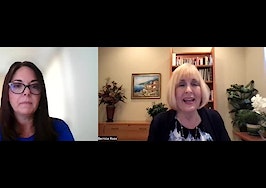No one can predict the future of real estate, but you can prepare. Find out what to prepare for and pick up the tools you’ll need at Virtual Inman Connect on Nov. 1-2, 2023. And don’t miss Inman Connect New York on Jan. 23-25, 2024, where AI, capital and more will be center stage. Bet big on the future and join us at Connect.
This post was updated Oct. 12, 2023.
Would you like to minimize your IRS tax burden and perhaps even reduce it to zero? If so, you need more than your typical tax preparer or CPA. You need a tax strategist who helps you plan your tax strategy long before you ever consider filing your taxes.
I recently interviewed tax strategist David A. Perez who explained how his role is different from your CPA or other tax preparer. While typical accountants or tax preparers collate your financial data and enter that data into tax calculation software, a tax strategist’s role is to help clients craft tailored strategies to minimize or even eliminate their tax liability long before filing their returns. Perez believes real estate is the best type of investment that you can make today.
4 distinct benefits of real estate investing over other types of investments
According to Perez, four distinct benefits of investing in real estate include:
Appreciation: Appreciation occurs when the value of the property (asset) increases over time. People often focus exclusively on the value in today’s market, rather than looking at how much the property value may increase over time.
Build wealth: Wealth is the accumulation of assets that can increase in value. Asset acquisition builds wealth.
Cash flow: The income generated from the property, often through rental income.
Tax deductions: Unless you’re invested in a high-risk sector like oil and gas, most other investments do not have the various tax benefits linked to property ownership.
Stop giving your money blindly to someone else
A foundational rule Perez follows and that he also advises his clients to follow is, “Never invest in things you don’t understand.”
To illustrate this point, the problem with investing in a mutual or indexed fund is that you don’t know anything about their management, their leadership, their marketing plans, etc. It’s also very difficult to track what exactly is happening inside the various companies included in those funds.
Perez explains an additional problem with the stock market vs. real estate investing:
In the stock market, I can have $100,000 today, tomorrow it could be $50,000, the next day could be $25,000, and by the end of the week it could be zero. In real estate, even if I’m going to lose, I still have my assets.
Moreover, real estate is a tangible asset that can be appraised to determine its value and that you can live in, rent, and/or use for business.
Understanding how depreciation works
Perez has created a video (check it out above) that is the best explanation I’ve ever seen about how depreciation works. It also includes an important insider tip that explains how to maximize your deductions with strategies that your CPA or tax preparer may not even know about.
Here’s the scenario, including the assumptions regarding the purchase:
- The improvements without the land are worth $250,000.
- You paid all cash for the property. (If you obtained a mortgage you would have to add that expenses to the insurance and property taxes in calculating your ROI (return on investment.)
- Annual property taxes are $4,000 and annual property insurance is $2,000 (total $6,000).
- You rent the property for $1,000 per month, or $12,000 per year.
- You net $6,000 per year of profit.
Traditional approach to depreciation
- The IRS says that the “useful life” of a home’s improvements is 27.5 years.
- To determine your tax deduction, take the value of your property minus the value of the land and divide it by 27.5. In this case, $250,000 divided by 27.5 is approximately $9,000 ($9,090) a year you can deduct using the 27.5 useful life guidelines.
- If you subtract $9,000 from your $6,000 profit, you now have a $3,000 loss. The cool thing is that did you really have a loss? The answer is, “No,” it was a paper loss provided by the IRS, so you get to keep your $6,000 of net income tax free.
- If you are what is called an “active investor,” you can take the $3,000 loss directly off your W-2 or other income. Being an active investor means you have a hands-on role of managing your real estate holdings directly at least 750 hours per year that you can document. If you currently have other full-time income and are not working full time in real estate investing and/or property management, you are most likely a “passive investor.” (Check with your CPA to see which category would apply in your case.)
- If you are a passive investor, you can use that loss against any profit from another property. If you don’t have anywhere else to apply it, you will already have the $3,000 as a loss to apply on next year’s tax return.
Your investor clients will love this: Use a “Cost Segregation Study” to maximize depreciation
According to Perez, this approach takes the property you acquired and breaks it into little pieces that you can use to accelerate the depreciation. For example, doors, windows, sinks, tiles, appliances, etc. all have a life span. Instead of having the distribute the depreciation out evenly over 27.5 years at approximately $9,000 ($9,090) per year, Perez says you can probably take about 25 percent of the depreciation in Year 1. In this scenario, that would be $62,500 instead of $9,000.
If you take your $6,000 in rental income and subtract 25 percent in depreciation allowed using a Cost Segregation Study, you now have a phantom loss of $56,500.
How depreciation lowers your taxable income
Remember, there are two types of investors — active and passive. If you’re an active investor and you earn $100,000 income, you can deduct the full $56,500 from your income and only pay tax on $43,500. In addition, you will continue to receive a tax-free check of $6,000 each year, but that amount will increase if you make improvements or raise the rents.
In addition, real property typically keeps pace with or exceeds inflation over the long term, so perhaps it goes up to $257,000 after the first year, up to $267,000, and so forth.
An important warning
Perez describes the risk of investing with people who make representations about the tax benefits you will receive.
It’s so frustrating because I get people who have been screwed over by some syndicator out there who doesn’t know up from down — it happens all the time. So, if you don’t even know what the term “Real Estate Professional Status” means, you’re probably not going to qualify for the tax benefits they told you about — all they’re doing is having you invest with them.
Remember, to be considered a REP you must work 750 hours per year on real estate-related activities. If you’re working full-time elsewhere, you’re unlikely to qualify.
Again, never take tax advice from an investor putting a deal together. Only your CPA or tax attorney is qualified to give you tax advice and how it applies in your specific situation.
To maximize your tax write-offs, speak to your CPA, tax strategist or tax attorney first
Perez urges:
Regardless, if you’re an active or passive investor, all these factors working together give you a tax deduction that creates tax free wealth. If you’re looking to save taxes every single year, I encourage you, I mean, I am begging you, figure out a way to get into real estate. It is the best way to minimize your tax liability, especially if you’re higher income earner, to build wealth, and to enjoy the immense satisfaction of not giving as much of your hard-earned money to the IRS.
Bernice Ross, president and CEO of BrokerageUP and RealEstateCoach.com, is a national speaker, author and trainer with more than 1,000 published articles. Learn about her broker/manager training programs designed for women, by women, at BrokerageUp.com and her new agent sales training at RealEstateCoach.com/newagent.













